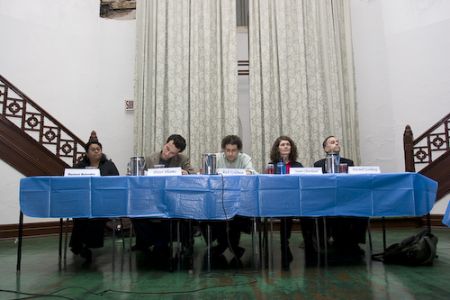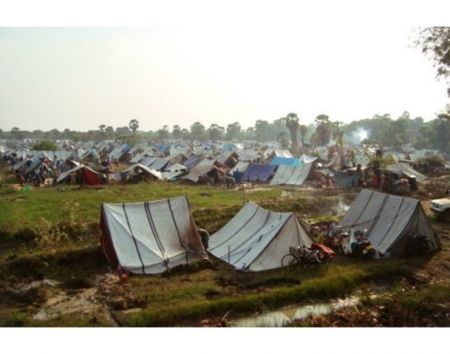Last night there was a panel discussion at Saint James United Church discussing the ramifications of the proposed bill C-49 put forward by the Conservative government concerning refugees coming to Canada. The panel was made up of Peter Shams from Amnesty International; Mitch Goldberg, an immigration lawyer; Janet Cleveland, a psychologist and researcher at McGill University as well as holder of the McGill Oppenheimer Chair of Public International Law; Rick Goldman from the Comité d’Aide aux Réfugiés and Ramani Balendra from the South Asian Women’s Community Centre.
The panel explained that if bill C-49 is passed it would have very detrimental outcomes for people claiming refugee status in Canada. The bill, which is ostensibly designed to discourage human smuggling, would in fact penalize refugee claimants once they were designated as part of a new “group” category. This category is poorly defined and could ostensibly include refugee claimants who arrive in groups of two or more people.
Presently detained refugees have the right to have their cases heard by a commission after 48 hours as well as a right to be heard by a commission once a month and to appeal the its decision. Under the new legislation, the claimants if designated as part of this new class would be subject to a mandatory one year detention, in which they would have no right be seen by anyone, or recourse to any sort of appeals process. Furthermore this mandatory detention would be blind to extenuating factors and would apply equally to sick, elderly, children, pregnant women or mentally ill people. The government has also stated that it would not pay for medication, or any other medical “extras” including mobility aids for handicapped people or eyeglasses for any of those detained. Indeed, Cleveland pointed out that this sort of hopeless detention has been shown to cause serious long-term mental health problems for those subjected to it. Beyond that, people designated members of this refugee category would have a mandatory five year waiting period before they could apply for permanent residence status, in which time they would be unable to sponsor other family members to come to Canada, as well they would be forbidden to visit anyone outside the country, further isolating them and keeping them in a protracted state of uncertainty.
This bill in many ways resembles an Australian law, in place for many years, that imposes mandatory detention on asylum seekers; however, that law is now being reviewed and undone in various ways since it has proven to be inhumane and furthermore has proven ineffective even in its goal of reducing the number of people seeking asylum through “illegal” channels. Legal channels, amongst other things, require that claimants have proper documentation - birth-certificates, passports and so on - a requirement that is often impossible to meet given the crisis situations that lead to refugees fleeing their country in the first place. Given this impossibility, bills such as C-49 generally give governments the opportunity to arbitrarily detain the majority of refugee claimants.
Bill C-49 seems to be in keeping with the Conservative penchant for implementing “get-tough” legislation that has already failed in other countries, similar to their get tough on crime policies that introduced mandatory sentencing, tougher penalties and the costly building of new prisons, which of course closely follow the policies first introduced in the US in the 70s and have now led to a prison crisis there.
This bill is supposedly meant to discourage illegal human smuggling, though it is unlikely to achieve that (as indeed it did not in Australia). The reason for this is simple - refugees need to leave the country they are in quickly and for serious reasons. They often have no knowledge of the immigration or refugee policy of the nation to which they escape. In the House of Commons, Citizenship, Immigration and Multiculturalism Minister Jason Kenney stated
“If [refugees] would like to come to Canada, they are free to fill out an application to come here as an immigrant. If they are in need of protection, they are free to enroll with the United Nations High Commissioner for Refugees. They should not come in the worst and most dangerous way possible, which is through a smuggling syndicate.” Of course, the standard immigration process takes years and only admits people who have skills and education. This process is clearly unfeasible for people in crisis situations. Also, often times it is impossible to enroll with the UN High Commissioner for Refugees. Balendra stressed the point that, for instance, in Sri Lanka, there was no way to pursue this option, and in Afghanistan it required people to make an incredibly dangerous voyage to the border with Pakistan. In many instances, she highlighted, human smugglers are the only workable option to get people out of these life threatening situations.
This bill has not yet passed into law, and it still has the possibility of being defeated. More information about what you can do to oppose this law is available at the Canadian Counsel for Refugees website at ccrweb.ca.





